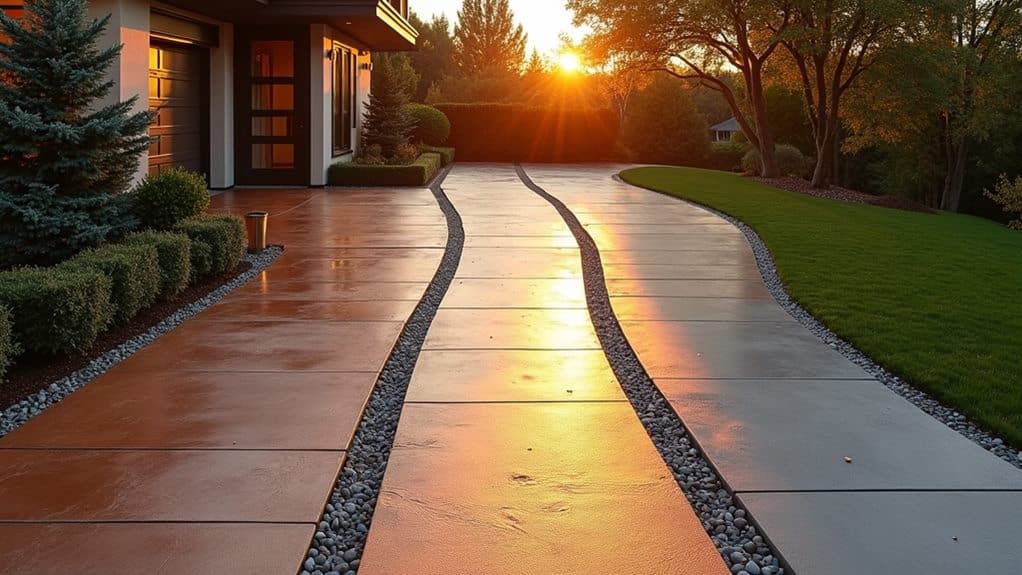Two main types dominate resin driveways: resin bound and resin bonded. Both use either polyurethane or epoxy resins.
Polyurethane resin offers better UV protection and flexibility, much like a well-fitted sports shoe, preventing cracks in your driveway. It costs £50-£80 per square metre.
Epoxy resin gives stronger adhesion at £30-£60 per square metre but tends to yellow, similar to old white plastic outdoor furniture.
Both need dry weather for installation and professional fitting on a solid base.
Whilst polyurethane takes 1-2 days to set, epoxy dries faster at 6-12 hours.
Think of polyurethane as the premium, long-lasting option, whilst epoxy suits tighter budgets where occasional yellowing isn’t a concern.
Key Takeaways
Polyurethane resin offers the best UV protection and flexibility for busy driveways, though it costs more at £50-£80 per square metre.
Epoxy resin works brilliantly for driveways with heavy vehicles and comes in cheaper at £30-£60 per square metre, but tends to yellow in sunlight.
Two main application methods exist: resin-bound, where materials are mixed on-site for a smooth finish, and resin-bonded, where stones are scattered over wet resin.
Both types need dry weather and temperatures between 10°C-30°C for proper installation – typical British weather considerations.
A well-maintained polyurethane driveway lasts 15-25 years, whilst epoxy driveways generally serve 5-15 years before needing replacement.
Understanding Resin Types
The choice of resin type is crucial for any driveway installation in Britain, with two main systems available: resin bound and resin bonded.
These systems require specific conditions for installation – notably dry, warm weather and skilled contractors for proper results.
Polyurethane resin, typically used in resin bound systems, offers excellent durability and flexibility, which helps prevent surface cracking – think of it as having a bit of ‘give’ like a sturdy trainer sole.
It holds up brilliantly against British weather and UV rays, making it perfect for our outdoor conditions.
Epoxy resin, found mostly in resin bonded systems, provides outstanding adhesive strength – ideal if you’re parking heavy vehicles regularly.
UV-stable resins are worth considering for exposed driveways, as they won’t fade or degrade in sunlight.
For areas prone to flooding or heavy rain, SUDS-compliant options ensure proper drainage, meeting UK environmental standards.
If time is tight, rapid-cure resin significantly reduces waiting time before you can use your new driveway – particularly handy during Britain’s unpredictable weather windows.
Polyurethane Vs Epoxy Resins
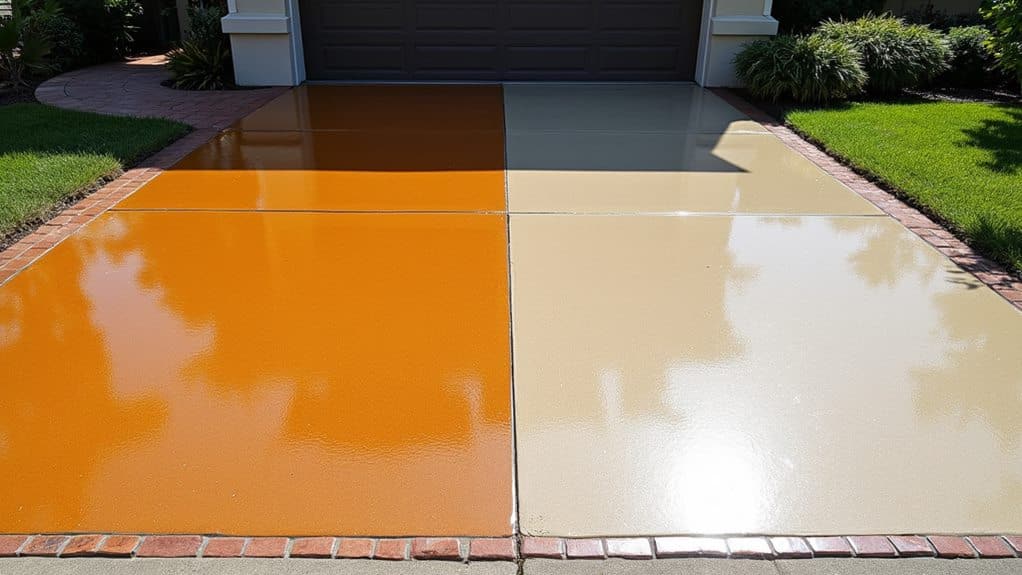
Choosing between polyurethane and epoxy resins for your driveway comes down to their core differences.
Polyurethane offers better UV protection and flexibility, whilst epoxy delivers superior hardness and chemical resistance. The cold-pouring method ensures proper stone coverage and lasting results with both materials, though professional fitting is essential.
Cost-wise, epoxy is cheaper upfront, but polyurethane typically lasts longer and handles British weather better.
Time is also a factor – epoxy sets in 6-12 hours, whilst polyurethane takes 24-48 hours to cure fully.
These practical differences often make epoxy the go-to choice for quick projects, though polyurethane remains popular for long-term durability.
Material Properties Compared
Material Properties: Polyurethane vs Epoxy Resins
Polyurethane and epoxy resins differ markedly in their performance and longevity. Polyurethane resins offer superior flexibility and elasticity, making them ideal for high-traffic areas where cracking resistance is essential. Following the correct mixing ratios is crucial for both materials, especially when incorporating aggregates.
Epoxy resins deliver a more rigid finish that withstands chemical spills and daily wear brilliantly – think laboratory floors or industrial workspaces. The trade-off comes with installation time: whilst polyurethane sets relatively quickly, epoxy needs a longer curing period, similar to waiting for paint to dry properly in damp British weather.
Temperature performance sets these materials apart. Epoxy handles extreme temperatures well, much like a good cast iron pan, while polyurethane tends to soften under high heat.
However, polyurethane wins hands down for UV stability and upkeep. Unlike epoxy, it won’t yellow under sunlight (a particular concern in conservatories or bright spaces), and its tough surface makes cleaning a doddle.
Epoxy surfaces need extra UV protection and more thorough maintenance to stay looking fresh, rather like keeping a white garden fence pristine through the seasons.
Cost-Performance Analysis
Choosing between polyurethane and epoxy resins boils down to weighing initial costs against long-term benefits.
Polyurethane costs £50-£80 per square metre, whilst epoxy ranges from £30-£60. Both need professional installation to ensure proper results and longevity.
Polyurethane offers better value through its superior flexibility and wear resistance, meaning fewer repairs over time.
Though epoxy cures faster (24-48 hours compared to polyurethane’s 72 hours), this short-term advantage doesn’t offset its long-term drawbacks.
Polyurethane handles British weather better, maintaining its appearance whilst epoxy tends to yellow and crack under UV exposure.
Epoxy also needs more frequent resealing and maintenance, driving up ongoing costs.
Think of it like choosing between budget trainers and quality walking boots – the cheaper option might save money now, but you’ll likely spend more replacing them.
Despite the higher upfront cost, polyurethane typically proves more cost-effective over your driveway’s lifetime, thanks to its durability and lower maintenance needs.
Installation Time Differences
Installation Times: Polyurethane vs Epoxy Resin
Installation duration is crucial when choosing between polyurethane and epoxy resin driveways. Polyurethane typically takes 24 to 48 hours to complete, whilst epoxy needs 48 to 72 hours to cure properly. This timing difference can significantly affect your project schedule, much like the difference between a weekend job and one that spills into the working week.
Polyurethane sets rather quickly during application, similar to working with fast-drying paint. This rapid setting means shorter project times, particularly for modest-sized driveways that can be finished in one day.
Epoxy offers more time for adjustments during installation but requires a longer overall project time due to its extended curing period.
Weather conditions heavily influence both materials’ installation success. Polyurethane proves more adaptable, needing less strict environmental controls during application.
Warm, dry conditions can speed up polyurethane’s curing process, whilst epoxy demands more specific conditions throughout its longer curing period.
Think of epoxy as being rather like laying a cricket pitch – the conditions need to be just right for the best results.
UV Stability and Weather Resistance
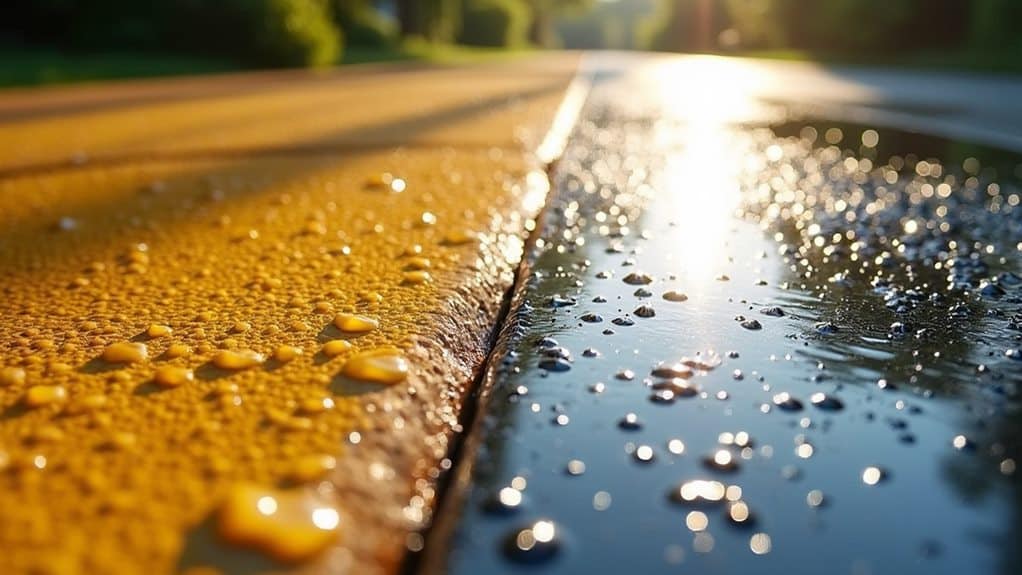
UV Stability and Weather Resistance
Choosing the right resin for your driveway requires careful consideration of UV stability and weather resistance – two crucial factors that affect long-term performance. Quality resins include UV stabilisers that protect against sun damage, helping your driveway maintain its appearance over time.
Installation must take place in dry, warm conditions for proper curing, making weather-resistant resins particularly important for British weather.
Well-formulated resin driveways typically last 15-25 years with proper maintenance, offering:
- Strong structural integrity that prevents cracking from temperature changes
- Reliable non-slip properties in wet weather
- Excellent resistance to British weather conditions, including rain and frost
These specialist resins are designed to withstand seasonal British weather patterns without fading or deteriorating.
Whether you’re in sunny Cornwall or rainy Scotland, a UV-stable, weather-resistant resin driveway maintains its look and functionality throughout the year. The investment pays off through consistent performance and minimal maintenance needs, particularly important given the UK’s variable climate.
Installation Methods and Requirements
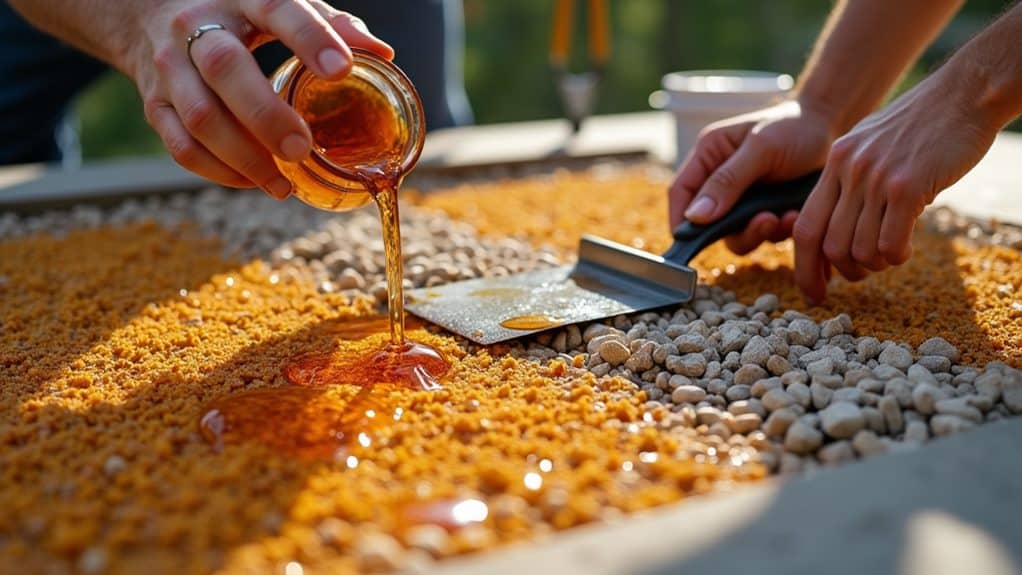
A quality resin driveway relies on precise installation and strict site conditions. The base must be solid concrete or asphalt, properly cleaned and level before work begins.
The standard mix uses 7.5kg resin to 75kg of aggregates for optimal results. For resin bound surfaces, contractors mix materials on-site to the right consistency, then spread and trowel for a smooth finish.
Different systems need different approaches. Resin bonded driveways involve applying resin to the existing surface, then scattering decorative stones for a textured finish.
Installation needs a skilled team of three: one for mixing, one for luting, and one for trowelling.
After installation, proper curing is crucial. Whilst walking on the surface is fine after 24 hours, vehicles must wait 48 hours.
These waiting periods ensure proper hardening and longevity. Following these requirements isn’t optional – they’re vital for a professional finish that lasts and meets UK standards.
Durability and Performance Factors
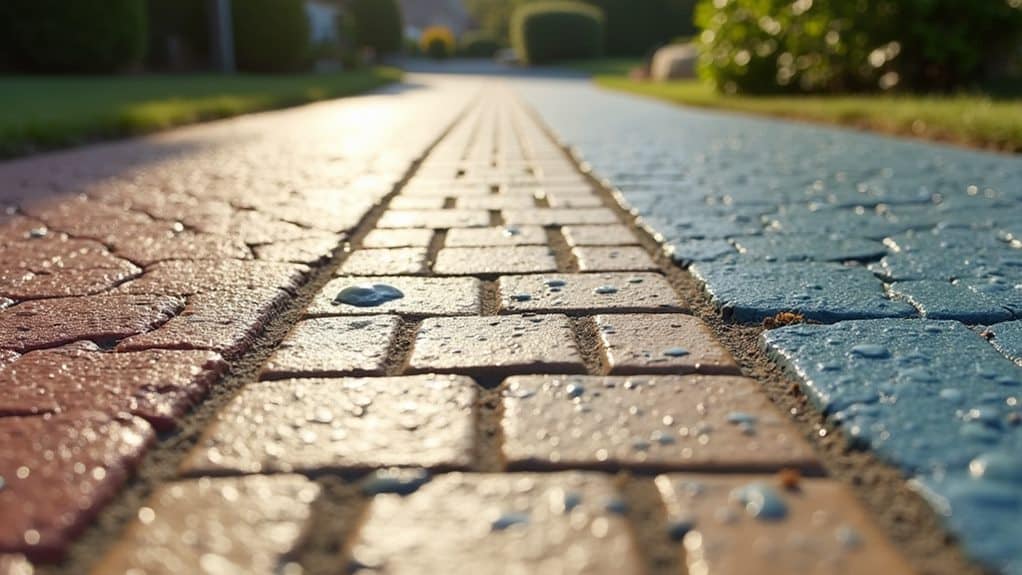
A resin driveway’s lifespan typically ranges from 15-25 years when properly installed, making it a robust choice for UK homes.
Professional fitting using the cold-pour method ensures the materials bond properly, much like making sure mortar sets correctly between bricks.
The UV-stable resins won’t fade or weaken in Britain’s varied weather, keeping their strength and looks even after years of sun exposure.
Thanks to the surface’s water-permeable nature, you won’t face issues with puddles or ice damage during our harsh winters – the water simply drains away naturally, protecting your investment for years to come.
Weather Impact Assessment
Weather Impact on Resin Bound Driveways
Resin bound driveways are becoming increasingly popular in the UK, largely due to their outstanding weather resistance. Quality resins feature UV-stable properties that prevent fading, keeping your driveway looking fresh despite Britain’s varied weather conditions. Proper installation by qualified professionals is crucial, particularly regarding curing times, to ensure the surface performs well year-round.
Three main features make these driveways weather-resistant:
- Superior drainage that prevents puddles and reduces frost damage
- Temperature stability that handles both summer heat and winter frost
- UV protection that stops sun bleaching and deterioration
A well-installed resin bound driveway typically lasts 15-25 years with basic upkeep. Regular brushing and occasional resealing help protect against typical British weather, from heavy rain to occasional snow.
The surface’s permeable nature means rainwater drains efficiently, whilst the durable composition prevents common issues like cracking during temperature changes.
Think of it like a good winter coat – with proper care, it’ll protect your property through all seasons whilst maintaining its appearance.
Regular maintenance is straightforward: a quick sweep and occasional wash keep it looking smart and functioning properly.
Longevity Testing Results
Resin bound driveways deliver exceptional durability, lasting 15-25 years with normal use – significantly longer than resin bonded surfaces, which typically last 5-15 years.
| Performance Factor | Impact on Lifespan |
|---|---|
| UV Stability | High resistance to fading |
| Frost Resistance | Minimal surface degradation |
| Traffic Wear | Exceptional crack resistance |
The driveway’s lifespan largely depends on proper installation and maintenance. A crucial factor is the resin to hardener ratio (H1: R: 1.03-1.05), which must be precise for optimal performance. Simple maintenance, like regular jet washing and cleaning up spills promptly, can extend the driveway’s life beyond expected timeframes.
Lab tests show these surfaces cope remarkably well with British weather conditions, from harsh sun to frost. The evidence clearly shows resin bound systems outlast traditional driveway materials when measuring durability and longevity.
Cost Considerations for Resin Driveways
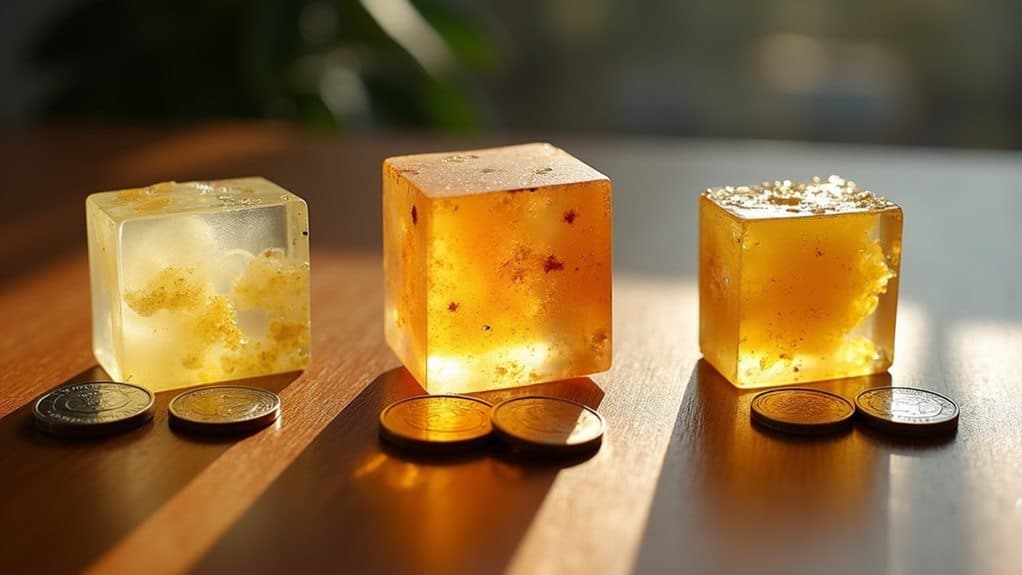
Resin driveway costs typically range from £50 to £120 per square metre in the UK.
Resin bound driveways cost more than resin bonded options due to their complex installation and material needs. These systems are particularly useful for meeting sustainable drainage requirements, especially in areas prone to flooding.
Your total cost will include essential base preparation, such as cleaning and repairing the existing surface.
Key cost factors:
- Installation work – Expert labour and specialist equipment needed, particularly for bound systems
- Material choice – Quality of resin affects both price and durability
- Your location – Local prices for materials and labour vary across the UK
Though the initial outlay is higher, resin driveways prove cost-effective over time.
Their durability and low maintenance needs balance out the upfront costs. Good base preparation is crucial for a lasting installation, so factor this into your budget.
Choosing quality materials and professional fitting will reduce future repair costs.
Maintenance and Care Tips
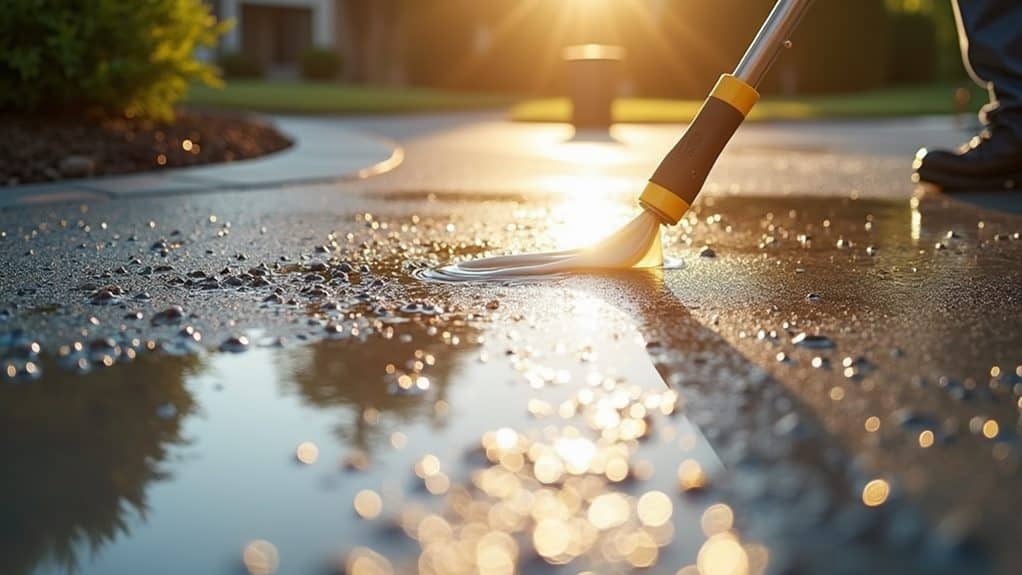
Proper care of resin driveways ensures they last longer and keep their good looks. Regular sweeping or using a leaf blower stops dirt and debris from building up.
For thorough cleaning, use a pressure washer at 150 bar or less – anything stronger risks damaging the surface.
For tough stains, stick to gentle cleaning products rather than harsh chemicals that could harm the resin. If you spot oil or chemical spills, act quickly – blot the area and clean it straight away to avoid lasting damage.
Keep an eye out for weeds. While resin driveways generally prevent most weed growth, some might still pop up. Either pull them out by hand or use suitable weed killer.
In winter, don’t use standard rock salt or grit – these can damage the resin. Instead, choose non-corrosive ice melts to protect your driveway’s surface.
These simple maintenance steps will help your resin driveway stay smart and sturdy for years to come.
Common Application Challenges
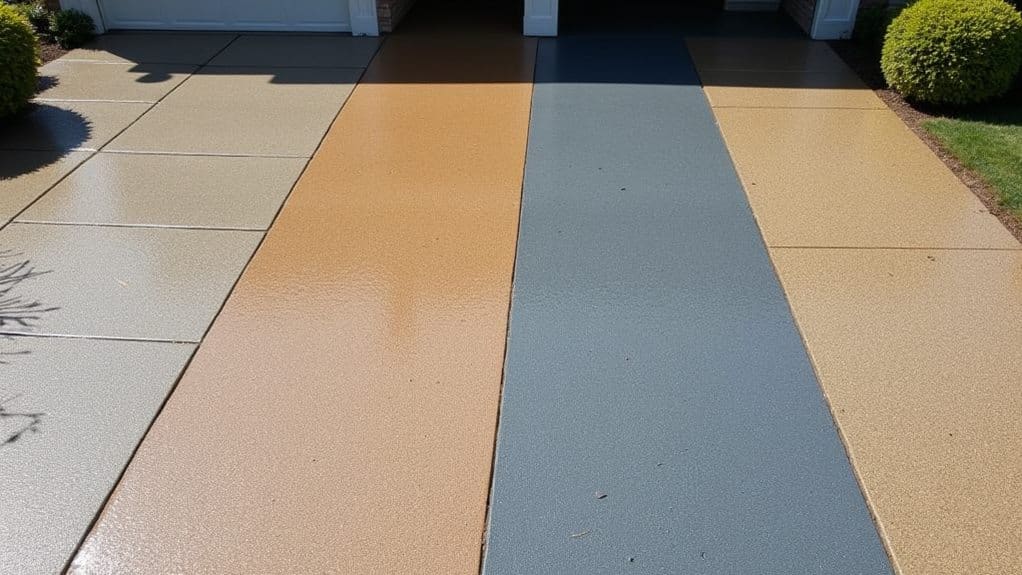
Common Installation Challenges with Resin Driveways
Getting a resin driveway installed properly comes down to tackling several key technical hurdles. Think of it like baking – the mixture must be spot-on, and the timing needs to be perfect.
The basics must be right from the start. Your base needs to be bone-dry and spotless – much like preparing a wall before painting. The resin mixture follows strict rules, with a precise ratio between 1.03-1.05 that can’t be fudged.
Critical points for a proper installation:
- Weather watch – avoid rainy days and cold snaps
- Proper drainage planning – crucial for British weather
- Even spreading – like icing a cake, it needs swift, consistent coverage
The trickiest part? Getting an even spread of resin and stones across the whole surface. It’s a job that needs proper skills and timing – much like laying concrete before it starts to set.
Most problems crop up when:
- The ground isn’t properly prepared
- The weather turns bad during installation
- The mixture isn’t properly measured
- The spreading isn’t done quickly enough
A skilled installer knows these pitfalls and plans accordingly, ensuring your driveway sets properly and lasts for years.
Choosing the Right Resin
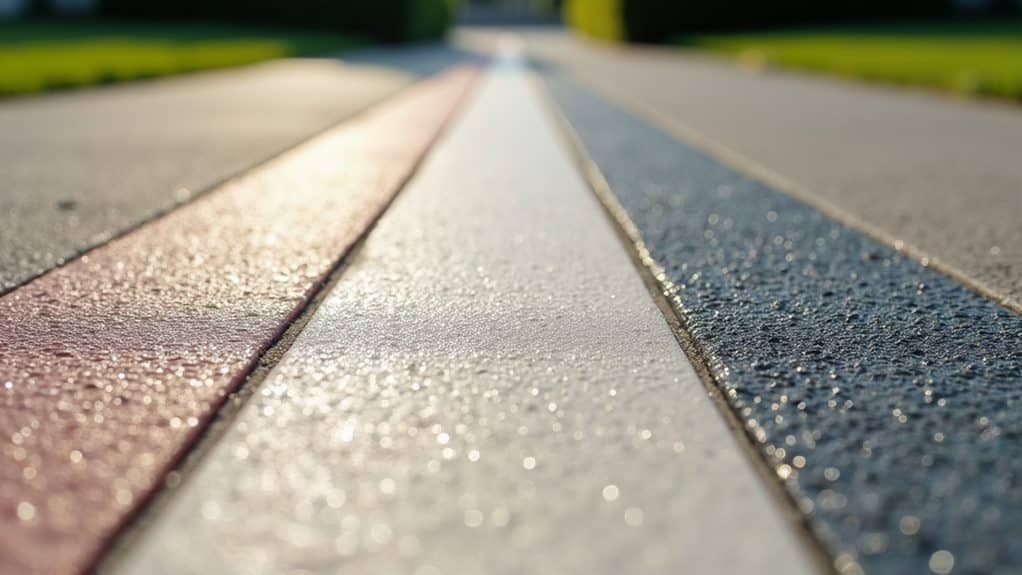
Choosing the right resin is crucial for your driveway project. You’ll need to weigh up key factors that affect how well it performs and lasts, particularly when deciding between polyurethane and epoxy resins for your bound system.
| Factor | Consideration |
|---|---|
| Material Type | Polyurethane offers better flexibility; Epoxy gives stronger adhesion |
| Mixing Ratio | Resin-to-hardener ratio varies (1:1 to 1:2 for polyurethane) |
| UV Protection | UV-stable resins prevent fading and yellowing |
| Temperature | Install between 10°C-30°C for proper curing |
| Drainage | Must meet SUDS requirements for water drainage |
The choice between resin bound and bonded systems depends on your specific needs. Think about your local weather – for instance, a driveway in rainy Manchester needs excellent drainage compared to one in drier East Anglia. UV protection is vital for exposed driveways, whilst proper mixing ratios ensure your surface stays solid. Getting these ratios wrong is like making a cake with incorrect ingredients – it simply won’t work properly.
SUDS compliance isn’t just red tape; it’s essential for preventing puddles and keeping your driveway usable year-round. Most UK councils now require proper drainage solutions, so checking local requirements before installation is vital.
Frequently Asked Questions
What Is the Best Resin to Use for Driveways?
UV-stable polyurethane resin stands as the top choice for UK driveways. It’s particularly suited to our British weather, offering outstanding durability and maintaining its colour even under constant sun exposure. The material flexes well with temperature changes – crucial for our varied climate – and provides excellent drainage to handle our frequent rain. Unlike cheaper alternatives, it won’t crack or fade after a few winters.
What Are the Two Types of Resin Driveways?
Two distinct resin driveway options exist in Britain: Resin Bound, offering a smooth, permeable finish with mixed stones throughout, and Resin Bonded, providing a grippy, textured surface where stone is scattered across the resin top layer. Think of Resin Bound as a stone-packed sponge and Resin Bonded as sandpaper, with stones fixed to the top.
What Are the Pitfalls of Resin Driveways?
Resin driveways come with notable drawbacks: steep initial costs, varying performance in British weather conditions (particularly during frost), regular maintenance requirements, tricky installation that demands professional expertise, gradual UV fading of colours, and limited options for patching up damaged areas. These practical concerns need careful thought before investing in a resin surface.
Which Is Better, Resin Bound or Bonded?
Resin Bound surfaces outperform their Bonded counterparts in most areas. They’re tougher, comply with UK drainage regulations (SUDS), and need less upkeep over time. Whilst the initial cost is steeper, you’ll get a longer-lasting surface that’s both smoother and more eco-friendly. Think of it like choosing between carpet and hardwood flooring – the pricier option often proves better value in the long run.
Conclusion
Choosing the right resin for your driveway isn’t as simple as it might seem. Both polyurethane and epoxy systems offer different benefits, but your choice should depend on British weather conditions, what’s underneath your driveway, and how you’ll use it. Whilst the technical details might seem daunting at first, taking time to select the proper resin will ensure your driveway performs well for years to come.
